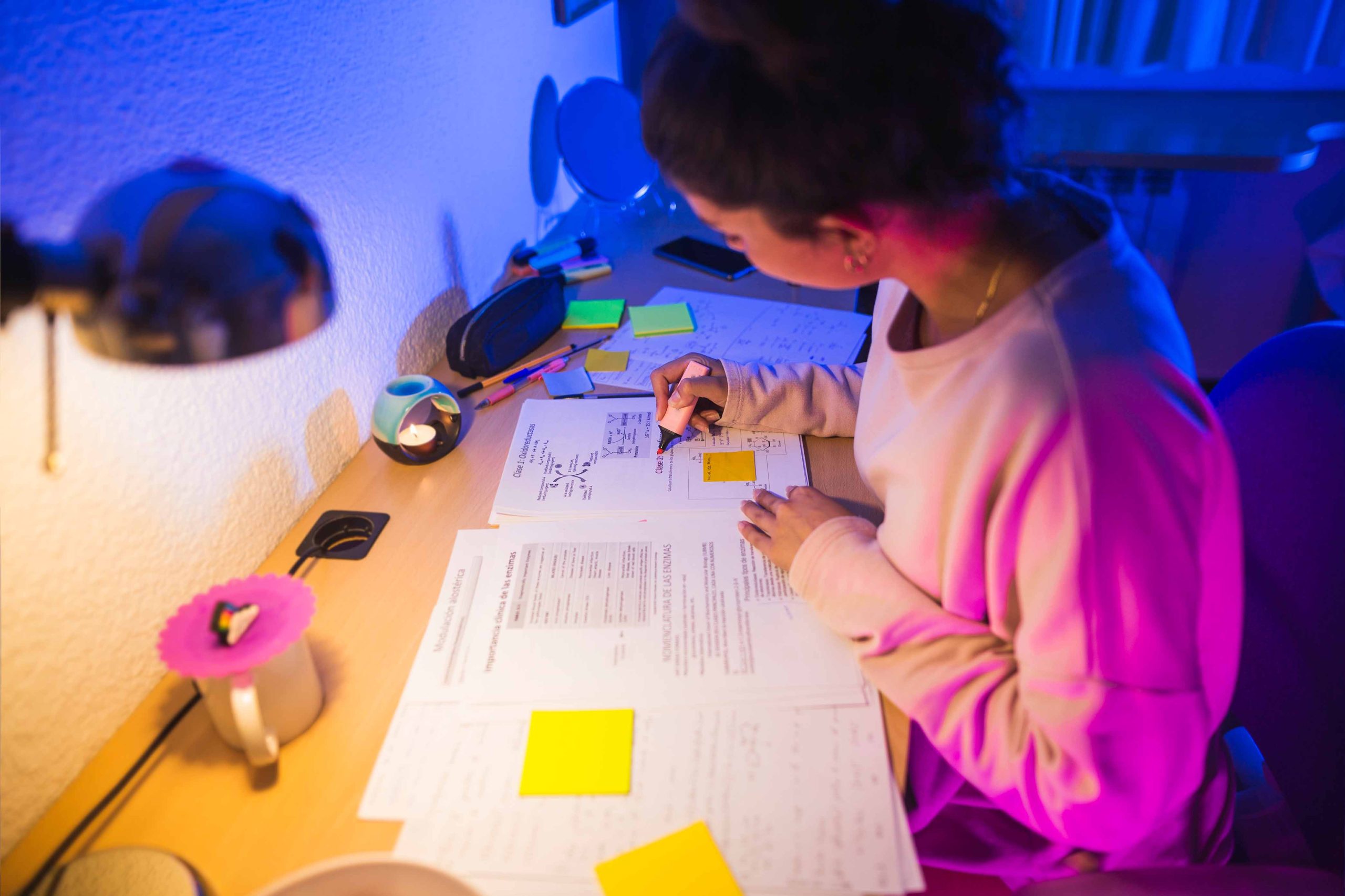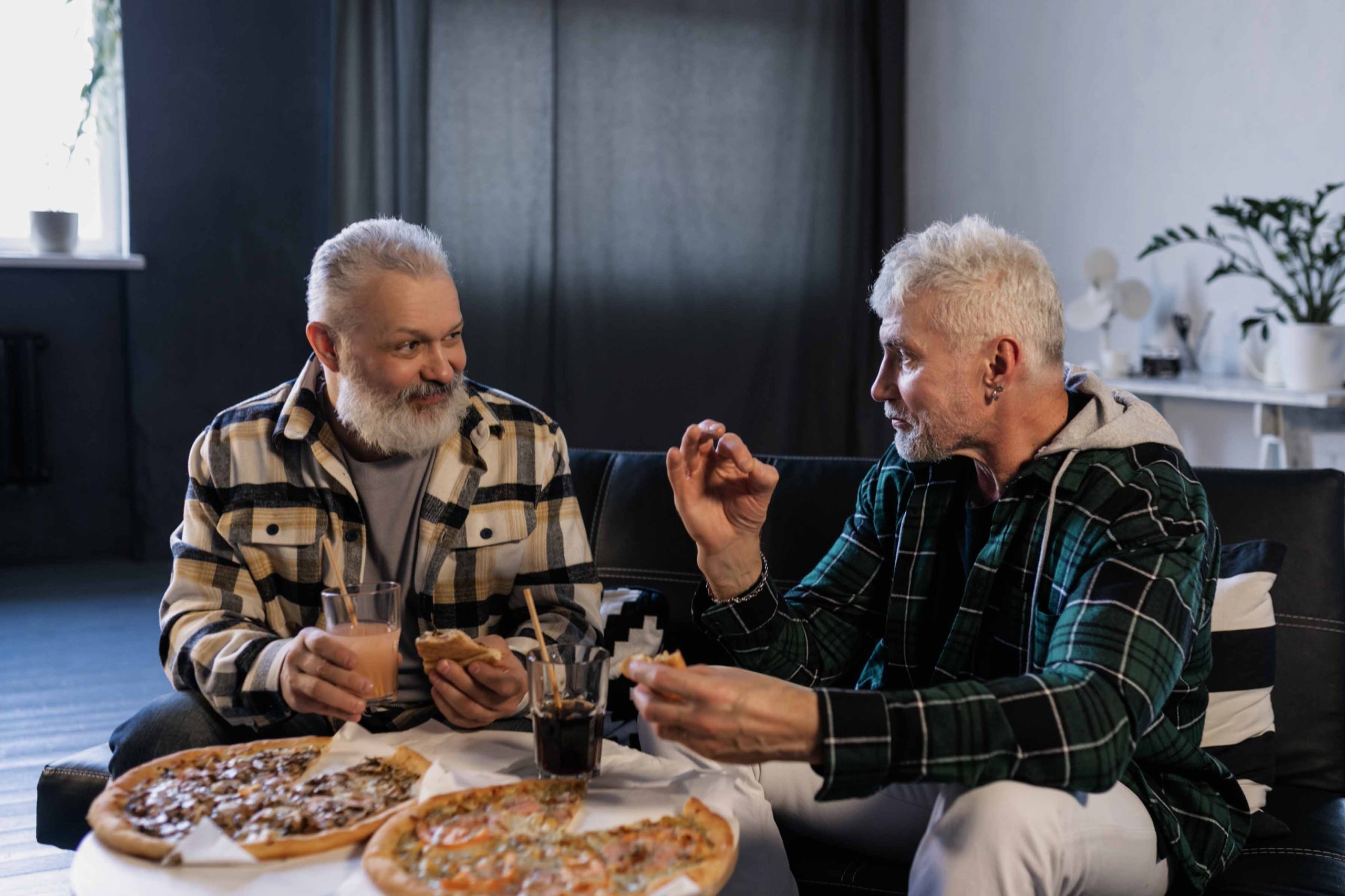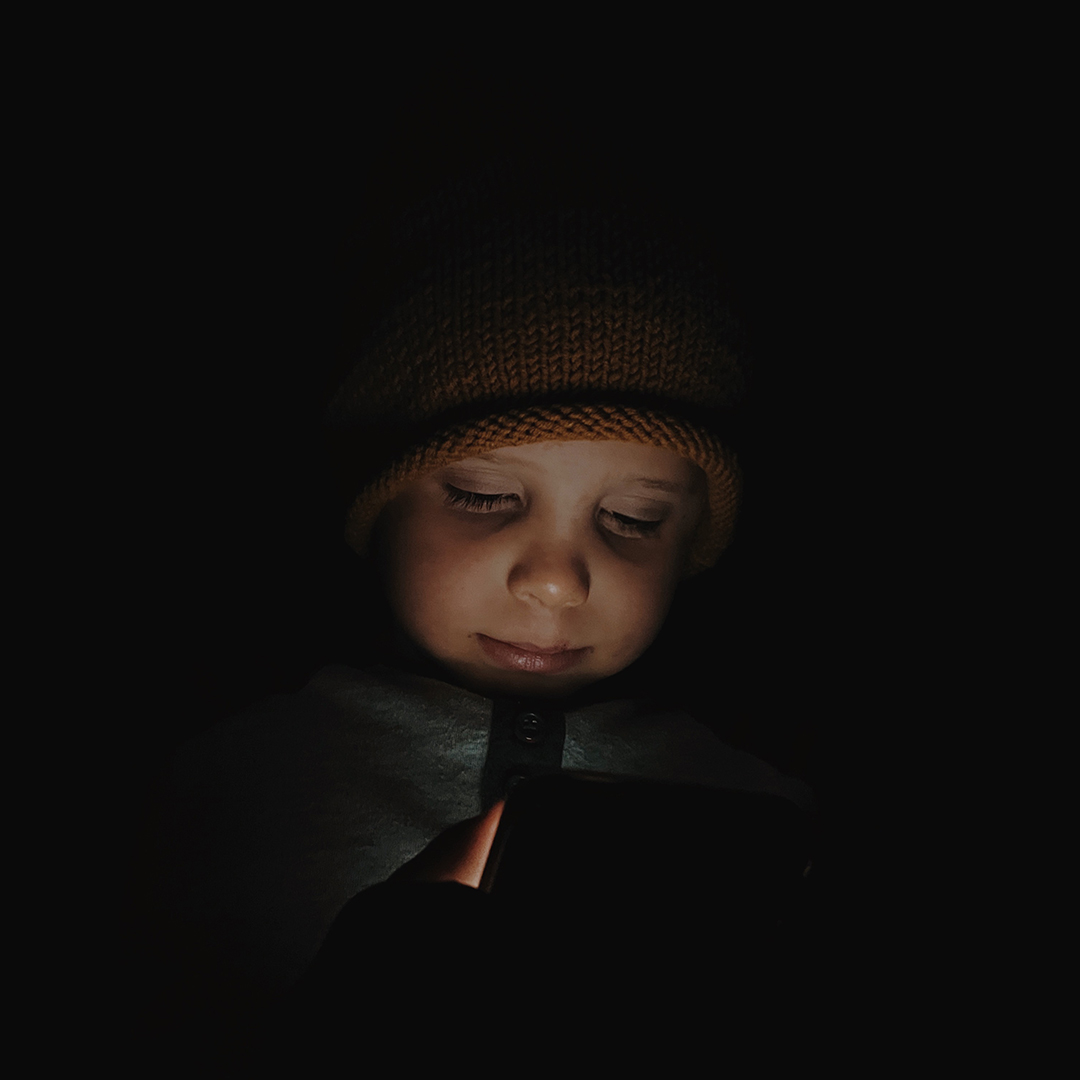How is an Eating Disorder approached from a nutritional point of view?
An eating disorder (ED) is wide term for several types of disorders related to a person’s eating habits and behaviors. EDs include eating disorders such as anorexia nervosa, bulimia nervosa, and binge eating disorder, explained in this article, but may also encompass other conditions that do not fit neatly into these specific categories.
EDs are characterized by a dysfunctional relationship with food and may involve obsessive concerns about body weight, body image, and eating. These disorders can affect both a person’s physical health and mental health and often require professional intervention and treatment.
Some additional examples of eating disorders that may fall into the category of EDs include:
- Orthorexia: An obsessive focus on food choices considered healthy, with extreme restrictions and anxiety around "unhealthy" foods.
- Vigorexia: Also known as muscle dysmorphia, this is an obsessive preoccupation with being muscular and strong, which can lead to excessive exercise and supplement consumption.
- Nocturnal eating disorder: People with this disorder have episodes of excessive food intake during the night.
- Pica: A behavior of eating things that are not food, such as dirt, chalk or hair.
- Rumination: The involuntary repetition of regurgitating food, which may then be rechewed, re-swallowed or spit out.
It is important to note that TCAs can be dangerous and have serious health consequences if not properly treated. It is essential to see a doctor for an initial assessment of the situation, as well as a nutritionist who can help us to cope with and overcome our eating problem.

How is a consultation with a nutritionist like to overcome an ED?
A nutritionist plays a key role in the treatment of eating disorders as part of an interdisciplinary health care team. Their goal is to help individuals establish a healthy relationship with food, improve their nutritional intake and address the physical aspects of recovery. Here are some of the main actions a nutritionist performs in the treatment of an eating disorder:
- Nutritional assessment: The nutritionist begins by performing a detailed assessment of the patient's medical history, eating habits, exercise patterns and body composition. This assessment helps to understand the severity of the eating disorder and to determine the specific nutritional problems.
- Meal planning and dietary guidelines: The nutritionist works with the patient to develop a balanced and personalized meal plan. This involves setting caloric intake goals, macronutrient distribution (protein, carbohydrates, fats) and healthy food choices.
- Nutrition education: Provides education about nutrition and the importance of a balanced diet. Helps the patient understand how food affects their physical and emotional health.
- Monitoring and support: The nutritionist works closely with the patient to regularly monitor progress and adjust the meal plan as needed. He or she also offers emotional support and reinforces the importance of maintaining healthy eating habits.
- Gradual introduction of foods: In some cases, especially in eating disorders such as anorexia nervosa, the nutritionist helps the patient gradually reintroduce foods they have avoided or restricted for a long time, making sure they do so safely.
- Managing food anxiety: Helps the patient develop strategies to manage anxiety and fears related to food, which may include gradual exposure techniques.
- Teamwork: Work closely with other health care professionals, such as therapists, psychologists and physicians, to ensure a comprehensive approach to treating the eating disorder.
- Self-care education: The professional Teaches patients self-care skills related to eating and maintaining a positive relationship with food over the long term.
- Relapse prevention: Once stabilization and initial recovery have been achieved, the nutritionist works with the patient to prevent relapse and maintain long-term healthy eating habits.
It is important to emphasize that the treatment of eating disorders is a multidisciplinary process, and that nutritional therapy is only one part of comprehensive care. Medical and psychological care are also essential to address the physical and psychological aspects of eating disorders.

Is it important then to work with a nutritionist and a psychologist at the same time to address an ED?
The relationship between nutrition and psychology is very close and complex. The way we eat, and our diet can have a significant impact on our mental and emotional health, and in turn, our emotional and psychological states can influence our eating habits and dietary choices. This is why the joint work of a nutritionist, and a psychologist is essential in the treatment of eating disorders and other food-related problems. Both professionals bring their knowledge and skills to address both the nutritional and psychological aspects of these disorders.
After an initial evaluation, where both professionals analyse the situation, they contact each other to coordinate the treatment. The nutritionist and psychologist work together to develop a comprehensive and coordinated treatment plan. This involves setting nutritional and emotional goals, as well as a joint approach to addressing the patient’s needs. It is important that there is regular communication to share relevant information about the patient. This allows them to adjust treatment as needed and ensure consistent care.
Emotional support from the psychologist is critical to help identify and manage feelings and emotions related to eating and the eating disorder. On the other hand, the nutritionist will educate the patient on the importance of balanced nutrition and the relationship between physical and mental health with tools provided by the psychologist.

To sum up, detecting an eating disorder can be challenging, but it is essential to pay attention to signs and symptoms that may indicate the presence of a problem. Early detection and intervention are crucial to recovery.
It is important to remember that recovery from an ED is a gradual process and that each person is unique. Recovery may take time and effort, but it is possible. It is crucial to seek help as early as possible and to maintain an ongoing commitment to treatment and support along the road to recovery. Full recovery is an attainable goal, and many people have been successful in overcoming EDD with the right support.
In these types of cases, the relationship between nutrition and psychology takes on significant importance. Eating habits and mental health are closely interconnected, and the two can influence each other in a variety of ways. It is critical to understand how psychological factors can affect our eating patterns and how our dietary choices can impact our mental and emotional health.
About the author
Adriana Martín is a clinical nutritionist at Sinews. She treats adults, adolescents and children seeking to improve their health through nutrition. She specializes in public health and also treats TCA, SIBO, chronic diseases and other pathologies, as well as muscle mass gain or weight loss. Her approach does not consist in providing closed menus, but in making people understand the importance of nutrition at every stage of life through different tools.
Sinews MTI
Psychology, Psychiatry and Speech Therapy
Diagnostic labels in the digital world. Some pros and cons.
In the last decade, and even more so after the COVID-19 pandemic, we have become more aware of the importance of psychological health, and many find it more normalised to seek therapy. Today’s digital age, with social media, celebrities, and influencers, has brought about a significant shift in how we perceive and understand psychological health, and therapy is not only for “crazy people” anymore. We hear about people’s struggles, their problems, how they accept their problems, and how they try to manage them. This is a good thing as psychological problems can affect our lives just as much, sometimes even more, as physical problems. Diagnostic labels, once confined to the offices of psychologists and psychiatrists, have become increasingly normalised, and words like “anxiety”, “depression”, “trauma”, and “dissociation” has become a part of our daily vocabulary when we describe how we feel. While this shift has its merits and positive effects, the increased focus and daily use of diagnostic labels have also introduced some challenges that we need to be aware of. This article will explore the pros and cons of diagnostic labels, acknowledging their growing prominence in our digitally connected world.
What are diagnostic labels?
Diagnostic labels are terms used by psychiatrists and clinical psychologists to describe and classify specific psychological health problems that a person might be experiencing. A diagnosis specifies different symptoms, feelings, thoughts, or behaviours a person experiences or emits. Depending on the frequency, intensity, and affect these symptoms have on or daily life and life quality, a diagnosis may be given. A diagnosis does not necessary explain why a person is struggling, but can help describe what a person is struggling with, being a term used when an accumulation of symptoms are presented together.

The Normalisation of Diagnostic Labels
Celebrities, influencers and social media platforms have played a crucial role in breaking down the barriers surrounding psychological health discussions. Many prominent figures have opened up about their struggles and experiences with diagnoses such as anxiety, depression, or ADHD. This transparency has helped increase awareness and reduce the stigma associated with psychological problems and mental health conditions, encouraging others to seek help and share their own stories.
Furthermore, social media platforms provide spaces for individuals to connect with others who share similar experiences and diagnoses. Support groups and online communities have sprung up, offering valuable peer support and resources for those navigating the complexities of psychological health. However, this increased visibility of psychological health issues and diagnostic labels also raises important questions about their use, understanding, and potential consequences. For example, we can see celebrities promoting the use of anxiolytics and antidepressants, powerful psychopharmacological treatments. The use of medication for psychological problems can be a very helpful as a short-term tool in order to facilitate the implementation of changes and development of good tools and strategies, however, this must be evaluated in each specific case with a mental health professional. Advertising the use as something that will change your life and take away your problems can be quite damaging. Not only is it not true, to this day we do not have a pill that by itself can take away our psychological problems, there are more things necessary in order to treat a psychological problem, but also, if the use of medication is the only treatment plan one follows, then one will have to be on medication for the rest of one’s life, which has been shown to have limited effects. It is good to remove the stigma of psychopharmacological treatments, as they are sometimes necessary and not problematic. However, some clients have sought therapy thinking that they are in denial or have suppressed their problems as they are the only person in their friend group who is not currently on anxiolytics or antidepressants, thinking there must be something wrong with them. Here, we might have taken the normalisation too far, as medication should be a helpful tool when necessary, and not a basic human necessity.

The Pros of Diagnostic Labels
The use of diagnostic labels can be a helpful tool for professional, enabling communication between disciplines and different professionals. It can be helpful when investigating certain problems and treatments, and give guidelines on how to intervene when encountering psychological problems.
For many individuals it gives a sense of relief when receiving a diagnosis, as one feels there is now a word or an explanation for what one is going through, and that this is not something one is going through alone. The normalisation of diagnostic labels has provided validation and recognition to many individuals, and knowing that others have similar experiences can reduce feelings of isolation and encourage people to seek the help they need. Diagnostic labels serve as a common language, enabling individuals to communicate their experiences more effectively. When people use labels like «depression» or «social anxiety,» it facilitates understanding and fosters empathy, both within and outside the mental health community.
In many healthcare systems, diagnostic labels are necessary for insurance coverage and funding allocation. A recognised diagnosis may ensure that individuals have access to the financial resources needed to support their therapeutic process.
The Cons of Diagnostic Labels
Even though there are many pros to the use and normalisation of diagnostic labels, there are some challenges we need to be aware of and take into account when using them.
Despite the positive aspects of normalisation, diagnostic labels can still carry stigma, even in today’s more open and accepting society. Prejudice and misconceptions about specific mental health conditions persist, leading to discrimination and social isolation. Some individuals may still avoid seeking help or disclosing their struggles due to the fear of receiving a diagnostic label, even though there is an increased awareness and normalisation of psychological problems. Sometimes receiving a diagnosis may also have a negative effect in other areas of a person’s life. For example, in some countries, you may have to pay extra for health insurance if you have received a diagnosis.
Diagnostic labels can introduce biases into both treatment and perception. Clinicians may focus on the label rather than the individual’s unique needs and strengths, and the specific functions the problems may have. We would therefore focus more on description of the problem and its symptoms instead of its specific cause and current maintenance. Additionally, the labels may even reinforce the experienced problems as they become a part of the identity of the person. For example, a person might avoid or be exempt from certain situations because of their diagnosis, when maybe they would have been able to manage it more or less well. It may also make it more challenging to get better, as one might focus more on the diagnosis than the treatment, making the diagnosis last forever when it does not have to.

The increased use of diagnostic labels in our daily vocabulary has led to a potential risk of overpathologisation, where normal variations in behaviour and emotions are labeled as disorders. This can result in unnecessary medicalisation and treatment. For example, nowadays we more often hear “I am anxious about the exam” and “that made me really depressed” instead of “I am nervous” or “I am sad”, which are perfectly normal emotions we sometimes need to have and experience. These emotions are not problematic or something that should be treated, as negative emotions are a necessary part of human life, as long as it does not start to affect your daily functioning or general quality of life.
The diagnostic process is not foolproof. Misdiagnoses can occur due to the complexity of mental health conditions, overlapping symptoms, or inadequate assessment methods. An incorrect label can lead to inappropriate treatment, sometimes even making a person feel worse. Also, it is important to remember that all individuals and their struggles are different. Two people with anxiety might need two completely different interventions, even though you could give them the same diagnostic label. If we use a standardised treatment plan or protocol with a certain diagnosis, we might not help the person in the best way possible. While labels can be empowering, they also have the potential to reduce individuals to a set of symptoms, overshadowing their uniqueness, function, and complexity. Additionally, our problems are not static and should be continuously evaluated. The symptoms we displayed when we received the diagnosis change, especially with adequate treatment, and we may therefore not fulfil the criteria of the set diagnosis anymore.
It is not to say that if we limit the use of diagnostic labels it means that a person’s struggles or problems are not that serious and it is the person’s fault they are going through it. A diagnosis should not be necessary for a problem to be serious or require attention and treatment. We always do our best with the resources we have in that moment, but sometimes our best might not help us enough to start feeling better, and may also lead to other negative consequences.
Balancing Act: Using Diagnostic Labels Wisely
In this new era of normalised diagnostic labels and the influence of the digital world, it is essential for psychologists and individuals alike to approach them with care and consideration, and be aware of their pros and cons. Removing stigma and normalising psychological problems is essential, and social media platforms are a great tool in order to achieve this. However, we need to be careful on how it is done, so we do not overpathologise normal negative emotions or problems, as this can then turn into even worse problems. We also need to be careful about who we listen to and follow on social media, as there are a lot of misinformation about psychological problems in social media.
About the author
GAmalie Hylland is a health psychologist at Sinews. She specializes in behavior analysis and modification, working with adolescents and adults. She has experience working with a variety of issues, including anxiety management, phobias and ruminative thoughts, assertive and social skills development, self-esteem, procrastination, self-harm and obsessive compulsive behavior. Her orientation is behavioral therapy, integrating evidence-based techniques and tools to help change the thoughts, emotions and behaviors that cause us problems.
Sinews MTI
Psychology, Psychiatry and Speech Therapy
Pillars of Learning: The Importance of the Learning Environment
How time flies! It seems like only yesterday we were enjoying a dip in the sea with our children and, in the blink of an eye, a new academic year has just started.
First exams will begin in a few weeks and now more than ever we realize how important is to have a study environment that facilitates the learning process. Therefore, throughout the following article, the team of professionals that make up our academic support service, will explain the conditions that a learning environment must meet to ensure a better academic performance.
Before getting down to the business, we need to answer the following question:
Which are the basic pillars that will lead to a successful learning process?
- Organisation.
- Time management.
- Appropriate learning environment.
Let us look at each of them:
Organisation
“External order facilitates internal order”. In other words, when we work in an organised and free of distractions environment, it is easier to focus on the task at hand and to organise our ideas.
Thus, we recommend that, before starting homework or studying a subject, students clean and tidy their room, especially the desk. Having an uncluttered desk and the school supplies available will help them to maintain the concentration for longer periods of time.
If they don’t have all the supplies they need ready, they will constantly have to get up from the chair, thus impairing their sustained attention span and making it difficult to focus on the task.

In addition to these very basic levels of organisation, it is important that they develop increasingly sophisticated skills as they grow up. By “sophisticated” we mean that they require a more advanced level of development of the executive functions. Let us see some examples:
- To organise their notes by category, they need to make use of folders, dividers, plastic sleeves, etc.
- To organise their weekly timetable, they will need to make use of the diary.
- To mentally order the contents of each topic, they will need to learn how to make summaries, diagrams and mind maps.
Time Management
Many children find it difficult to estimate the time required to complete their homework, projects and study a subject. The truth is that, actually, it is an essential skill that is often not given the importance it deserves.
Learning to manage their time better will help them to:
- Turn in assignments on time.
- Increase their autonomy.
- Reduce their stress levels.
- Maintain their achievements.
In fact, more and more schools are taking the initiative of giving each pupil a school diary at the beginning of a new academic year, as well as a school calendar showing the dates of exams and projects that are due. This is a great way to help develop time awareness and anticipation.

Appropriate Learning Environment
Many of you probably remember being scolded by your parents for having a messy bedroom or doing homework with the television on. At the time, we probably did not understand why such details were so important. Now, as adults and parents of our own children, we fully understand their motives.
Nonetheless, there is no need to go back to that time. We can name thousands of examples from daily live in which the work or learning environment plays an essential role in our performance.
For instance, let us think about the reception desk of the company where we work or the library in our neighbourhood. Everything is neatly arranged, each form has its own drawer, each document is stored in a particular folder. All these places share a common feature: they meet some requirements that help to increase concentration, efficiency and thus, favour productivity.
When an environment does not meet these ideal features we, as adults, have a developed ability to constantly redirect the attentional focus to the task, inhibiting irrelevant stimuli. However, children’s brain, which are still developing, have more difficulty in self-regulating, which is why it is so important that external order exists.

What requirements need to meet a suitable learning environment?
- It should always be the same and, if possible, exclusively for him/her. Setting aside a physical space exclusively for studying helps to acquire the habit and improve concentration, because the brain makes this association between place and activity, facilitating orientation to the task.
- Always the same timetable. Having a pre-set study time will help them to create a habit and develop those time management skills we mentioned earlier.
- It must be well lit. Ideally, study in natural light, but when artificial light is necessary, a lamp with a blue bulb of no less than 60 watts is recommended.
- Suitable furniture and supplies. They should have a large desk and a comfortable chair that favours a proper posture. In addition, before starting, all the supplies that are going to be needed should be on the table. In this way, they avoid constantly getting up from the seat and losing the concentration.

- Reduced environmental stimulation. The place chosen should be the one where there is not usually a lot of noise. For example, if the living room is very bright but overlooks a main street with heavy traffic, will not be the right place. On the other hand, if their bedroom has less light but is quieter, we will choose it first.
- Well ventilated and at the right temperature. It is advisable for the study place to have a window to be able to renew the quality of the air every now and then, as well as to maintain a stable temperature of between 20ºC and 22ºC approximately.
Last but not least, we do not want to end this article without mentioning the use of electronic devices. Nowadays more and more schools have adopted what is known as “e-learning”. That is, the use of the internet and electronic devices as a teaching-learning tool, where teachers create a virtual space where they can share documents, assign homework and solve their student’s doubts, without the need to schedule a face-to-face tutorial.
While it is true that this tool is very practical and motivating for pupils, we must take into account the overuse of electronic devices nowadays and the increasing risk of addiction that they entail. We therefore recommend that, at least during study hours at home, access to mobile phones, tablets and other devices should be restricted, except when absolutely necessary.
We at Sinews hope that reading this article has been useful and we encourage you to put all these tips into practice to ensure better academic performance.
Finally, we would like to remind you that, for those students who find it difficult to keep up with the academic pace, our academic support service professionals will be glad to help them in everything they need.
About the author
Alba is a neuropsychologist and coordinator of specialized support services in psychoeducational and speech therapy in schools and homes. When families get in touch with Sinews requesting any of these services, Alba conducts an initial assessment interview to thoroughly understand the situation and assign the most suitable professional for each case. Furthermore, she maintains constant communication with schools, families, and professionals to ensure that progress is favorable and that the set objectives are being achieved. She also oversees the integration of new professionals into a constantly expanding team.
Sinews MTI
Psychology, Psychiatry and Speech Therapy
The Power of Language
We have all experienced it. The power language can have. Just by emitting certain types of words in a certain order a person can make us cry, laugh, smile, or explode. They can make us feel good, or they can make us feel absolutely terrible.
Language is a great tool we have as human beings. It allows us to communicate with others in a more efficient way, plan and anticipate what will happen in the future, and reminisce about the past. It can help us to express our emotions and explain our behaviours so people around us can more easily understand what we are going through. However, language is a very powerful tool, and we should therefore be aware of its powers.
All language is learnt. We are not born with a language, but we are born with the ability of its development. From the moment we are born, we embark on a journey of learning language. As infants, we begin to absorb sounds, gestures, and expressions from our caregivers, gradually building our vocabulary and understanding of syntax. Language is a social construct, passed down through generations, and it evolves as society changes and differs depending on the context you find yourself in.

Language also gives us the power of emotional time travel. For example, if we think about things that happened in the past that made us sad, we start feeling sad in the present moment. Maybe not to the same degree or with the same intensity as we felt in the past, but we start feeling worse than before we started to think about the sad thing that happened. If we think about something exciting than is going to happen in the future, for example a fun trip, we start getting exited in the present moment, even though we have not yet travelled anywhere. This can be both helpful to us and give us some challenges. When we think about positive things that have happened or that will happen, it can help to motivate us to do the behaviours necessary in order for it to occur or occur again. When we think about negative things that happened in the past, it may help us to find different ways to go about what happened so that we do not have to experience the negative consequence again. However, sometimes we might take this to a more extreme level where we start to think about all possible negative scenarios that may happen in the future, something that makes us feel bad without actually being helpful for us.
Language is not innocent. The words we use are conditioned with different emotional responses. This means that when we say a word, we also feel an emotion. For example, if somebody tells us we are very pretty or very ugly, those two words will provoke different emotional responses in us; we would feel good if they called us pretty and bad if they called us ugly. If somebody tells us we are pretty or ugly in a language we do not understand, we do not feel any different as these words have not yet been learnt or conditioned. This is also why we often feel more when speaking or hearing our native language compared to a second language we have learnt, as our native language tends to have a greater emotional association and therefore provoke stronger emotional responses than languages we learn later on. Sometimes it can therefore often be easier to say difficult things in our second language as the words do not provoke as strong emotional responses as in our native language, keeping our emotions more easily in check. This can also make it trickier when learning a new language as we have not yet learnt how to properly use the most adequate vocabulary or expressions depending on the context. We might say things that sounds more offensive than what we intend to, or we are not able to provoke the desired reaction in the other person that we wish to.

Language not only shapes emotions but also plays a role in guiding our behaviours. The way we describe and label actions can influence how we perceive and respond to them. For example, someone who habitually uses the phrase «I’m a procrastinator» might start to associate themselves with this label and make it their identity. This does not only describe the typical avoidance we do of tasks, but it may facilitate an even greater avoidance as this is “who we are”. The same goes for all negative words we pair with “I am”, such as “I am stupid,” “I am ugly,” etc. We are not stupid. There are many times we might say or do stupid things, but that is not enough in order to label our whole identity as stupid. We can definitely find many exceptions where we have not done or said something stupid, so “I am stupid” is not a good word for us to use to describe ourselves. When we say “I am” + a negative word, it may lead to behaviour changes that limit ourselves. If I repeatedly say that “I am stupid”, that might influence how often I raise my hand in class or make new suggestions to my boss. By being aware of our language, we can reshape our self-perception and encourage positive behaviours. Instead of saying «I’m bad at public speaking,» one might choose to say «I’m working on improving my public speaking skills.» This change in language can foster a growth mindset and empower individuals to take action towards self-improvement.
The power language can have is something politicians are very aware of. By pairing two words together, for example “women” and “stupid” or “immigrants” and “crime”, you start creating associations between the words and therefore also between the emotions they would provoke. Even though we would not think women are stupid, when repeatedly presented with the combination, it may still have an effect we are not completely aware of, and it may start to influence our behaviour, for example when selecting new personnel for a job. We also know that immigrants are not necessarily criminal, but if we often hear the two words paired together, we start associating the word “immigrant” with similar negative emotions as the word “crime” provokes in us. This may then change our behaviour towards or in the presence of immigrants, even though we know immigrants are not criminal and we do not want it to affect our behaviour.

As we can see, language is not innocent but a very powerful tool. By making ourselves more aware of its powers, we can lower the negative influence it may have on our behaviour. And use this to our advantage and not limit ourselves. By choosing our words more carefully, even though the way in which we say things may seem similar or irrelevant, we can avoid giving ourselves unnecessary limitations and help us to feel better and use it as we intend to.
About the author
Amalie Hylland is a health psychologist at Sinews. She specializes in behavior analysis and modification, working with adolescents and adults. She has experience working with a variety of issues, including anxiety management, phobias and ruminative thoughts, assertive and social skills development, self-esteem, procrastination, self-harm and obsessive compulsive behavior. Her orientation is behavioral therapy, integrating evidence-based techniques and tools to help change the thoughts, emotions and behaviors that cause us problems.
Sinews MTI
Psychology, Psychiatry and Speech Therapy
Toss and turn, toss and turn: Why can’t I sleep?
Sleep is an essential aspect of our overall well-being, yet many individuals struggle to achieve restful and deep sleep. Sleep hygiene, a set of habits and practices aimed at promoting quality sleep, plays a vital role in ensuring restorative rest and maintaining good health.
What happens when we sleep and why is it important?
Sleep is a complex physiological process vital for memory consolidation, emotional regulation, and physical restoration. During sleep, the brain and body undergo essential repairs, allowing us to wake up feeling refreshed and reenergised, and lower our probability of developing health problems such as cardiovascular problems, or a weakened immune system. If we have a disrupted sleep pattern, not only does it increase the likelihood of developing health problems, but it can also affect our mood and overall well-being and quality of life.
There are several physiological processes involved when we sleep. We all have an internal biological clock, known as the circadian rhythm, which helps us to regulate our sleep-wake cycle. It is influenced by external factors such as light and darkness. Disruptions to the circadian rhythm, such as irregular sleep schedules or exposure to artificial light at night, can lead to sleep disturbances and health problems. This is also why we feel jet-lagged when travelling to other time zones, and why we might struggle with shift work. In order to help us sleep well and stay awake, we are also influenced by different hormones. When it is time to sleep, our body will release more of the hormone melatonin, which makes us sleepier. When it is time to wake up, more cortisol will be released, making us more prepared to start our day.

What then is interrupting my sleep?
There are many different factors that may influence our poor sleep. Some general examples of what tends to make it more difficult for people to have a good sleep quality, is an irregular sleep schedule or having a high physiological activation. Changing our sleep schedules everyday makes it more challenging to have good quality sleep, as you then work against your internal clock and hormone release. Your body might not be prepared to fall asleep when you go to bed. If you have been stressed most of the day and had a high physiological activation during the whole day or just before going to sleep, it would also be more difficult. You are then preparing yourself for a possible dangerous situation, and your body would not allow you to enter deep sleep as you must be prepared to fight or flight.
How can we develop a good sleep hygiene?
Sleep hygiene encompasses a range of practices that facilitates healthy sleep patterns and promote better sleep quality. There are several things we can do in order to increase our sleep quality, here are some general examples.
What can I do during the day or evening?
Regular physical activity promotes better sleep. Aim for at least 30 minutes of moderate exercise most days of the week. However, avoid vigorous exercise close to bedtime, as it may make it harder to fall asleep. Be mindful of your diet, especially in the evening. Avoid heavy meals close to bedtime, as they may cause discomfort and disrupt sleep. Consider a light snack if you feel hungry before bed, but avoid large meals. Try to limit naps during the day. While short daytime naps can be refreshing, long or late-afternoon naps may interfere with your ability to fall asleep at night. If you need a nap, keep it short, preferably under 30 minutes, and avoid napping too close to bedtime.

What can I do before I go to bed?
- Implement a consistent sleep schedule. Maintaining a regular sleep schedule, helps regulate the circadian rhythm. Try to go to bed and wake up at the same time each day to establish a consistent sleep-wake cycle. This may be challenging as we tend to have plans later in the evening during the weekends, but it is helpful to not change more than one hour in each direction. If one day you go to bed a lot later than usual, try not to sleep in too long the morning after. “Catching up on sleep” may make it more difficult for us to establish a stable pattern, as we then more easily change our rhythm.
- Associate bed with sleep and relaxation, nothing else. Your bed is for two things, sleep and sex. Make sure to not work, scroll on your phone, or watch TV in bed. We then associate the bed with being more activated, something that can make it more difficult to fall asleep.
- Try to limit your caffeine and alcohol intake in the evening, and especially before going to bed. Even though alcohol can make you feel more tired at first, it can disrupt sleep patterns and lead to fragmented sleep.
- Develop a relaxing routine before bedtime to signal to your body that it's time to wind down. Between 30 minutes and one hour before your bedtime, make sure to stay away from screens and do more relaxing activities, such as reading or breathing exercises. Try to think about more neutral things, or at least to not think about topics that are stressful.
What can I do when I lie awake in bed?
When you are lying in bed and cannot sleep, try to focus on relaxing and not so much about falling asleep. If we constantly look at the time and calculate how many hours there are left until we have to get up, we become more anxious and activated, something that makes it even more difficult to fall asleep. Therefore, you should avoid looking at the time, as you do not feel more relaxed by knowing how little sleep you will get in the end and how much this will mess up your day. Paradoxically, telling yourself that you should not fall asleep facilitates its initiation. It is therefore better to tell yourself “You are just going to lie here and relax, this is good for you. Do not fall asleep, just lie here and relax”.

In order to help maintaining the association between our bed and falling asleep, it is important to not stay hours in bed tossing and turning. If you have stayed in bed more or less 15 minutes without falling asleep, leave the bed for a couple of minutes before you lay back down. During this time, it is important to not do an activity that activates you, but for example get a glass of water, go to a different room and then back, etc. Do not look at screens or check what time it is. Getting up every 15 minutes is quite frustrating, however, it will make you associate your bed with sleeping, something that will facilitate you falling asleep.
Changing a whole sleep pattern requires time and a lot of patience. There may be many other reasons for why a person might struggle with initiating or maintaining sleep than what has been presented here. If this is something you struggle with and has started to affect other areas of your life, it may be helpful to seek therapy to receive an individual analysis and treatment plan for your specific case.
About the author
Amalie Hylland is a health psychologist at Sinews. She specializes in behavior analysis and modification, working with adolescents and adults. She has experience working with a variety of issues, including anxiety management, phobias and ruminative thoughts, assertive and social skills development, self-esteem, procrastination, self-harm and obsessive compulsive behavior. Her orientation is behavioral therapy, integrating evidence-based techniques and tools to help change the thoughts, emotions and behaviors that cause us problems.
Sinews MTI
Psychology, Psychiatry and Speech Therapy
Procrastination, a Student’s Worst Enemy
Every year I have a plan, to get organised and to not wait until last minute. I’ll start studying for my exams from day one. Every year, this plan fails after a couple of weeks. Come exam time, my eyelids rarely get to close, my stomach has no idea when to expect food, a stable sleep schedule is a mythical utopia, there is no difference between the moon and the sun, and my poor coffee maker really gets to sweat. I feel stressed, exhausted, and angry at myself for allowing this to happen once again.
Procrastination is very stressful and it makes me feel awful, so why do I keep doing it every single year? Why do I never learn?

Why do we procrastinate?
Procrastination is a common struggle that many individuals face in their personal and professional lives. It involves putting off tasks or decisions that need to be completed, often leading to unnecessary stress and decreased productivity. Procrastination is a complex behavioural pattern that can be maintained by various factors. The reason for its maintenance is varied depending on the person, but here are some general examples of what we typically see in the clinic:
- High effort: as humans, we tend to do behaviours that require less effort, save energy, and give us pleasure. Studying is a behaviour that requires a lot of effort, therefore it is harder for us to initiate the behaviour and maintain concentration for a long time.
- Perfectionism: sometimes we want our work to be as perfect as possible, something that will require an even higher effort to initiate and maintain the behaviour of studying. We therefore often find ourselves in a situation where we will do something perfectly to the last detail or to not do anything.
- Immediate negative feelings: when we start studying, we will often experience immediate negative feelings, such as stress, boredom, feeling overwhelmed, or feeling that we are stupid for not understanding well what we read. If we avoid studying, we will not experience these negative feelings, something that makes it more likely that we will avoid it. Also, if we do something else instead, like watching Netflix, scroll on our phones, or hang out with our friends, we are immediately entertained, something that tends to win the competition when presented with the alternative of being stressed and bored.
- Past learning experiences: many times, even though we have left everything to the last minute, we pass the exam or assignment. Therefore, we do not have the learning experience that procrastination does not work as we then in the end are not able to hand in the assignment on time, or to pass everything.
- Excuse for not passing or obtaining a “bad” mark: if we really try our hardest to do well and to pass everything and in the end we don’t, that will probably provoke a lot of negative emotions, and maybe the feeling of failure, stupidity, or disappointment. If we leave our studying to the last minute, we can tell ourselves that the reason for not doing well is just because we started too late, not because we would not have been able to do better. This may soften the blow when receiving disappointing results.
Procrastination is something we often detect that we are doing, and it makes us feel very guilty as we know that we should be studying. So why do we not study then, when not studying also gives us negative emotions?
Chores, often we find genius ways of lowering the guilty feelings, none of which actually includes studying. For example, students never tend to have tidier flats or cleaner clothes that during the exam period. These are chores that are not fun to do but something that is necessary, so we feel better about procrastination as we spent our time doing something productive and essential, but that was not as bad as sitting down to study.

“I’ll do a double study session tomorrow”. Instructions that we give to ourselves might also lower the guilty feelings we experience. I do not feel too bad about not studying today if I can make up for it tomorrow. A problem with this is that if it was too difficult to do a study session today, it is not going to be easier to do it tomorrow, especially not if I double it. The required effort will then be even higher and it will be even more difficult to initiate the behaviour, and therefore it is more likely we will procrastinate more.
When do I start studying?
Usually, when the deadlines or exam date are approaching, the more stressed we become. When the stress reaches a level where it provokes more stress in us to avoid studying than actually study, that is when we are finally able to sit down and get some work done. However, it does not tend to be a pleasant experience.
What can I do to lower the chance of procrastinating?
Organise your study space:
- Make sure to have a clean study area without too many distractions like pictures, decorations, or things that you do not need for studying.
- Leave your phone out of reach so you would have to move to get it. Often we pick up our phone without realising it, so it is good to increase the effort to do so, so that we do not do it automatically.
- The only thing you should be doing in our study area is studying. You should avoid studying in bed, where you relax, or where you do fun activities, and you should also avoid doing fun activities or relax where you study. This will help you to associate the specific area with studying, something that will help you stay concentrated.
Prepare your studies:
- Plan and organise your work and assignments. Prioritise what you will do depending on urgency or importance. It can be helpful to use calendars and lists to get a clear overview of what needs to be done.
- Break down your tasks. Large tasks can feel overwhelming, something that may facilitate procrastination. Break the tasks into smaller, more manageable steps, and focus on one step at a time.
- Change tasks, study method, or subject during your study sessions. The longer we sit with the same thing, the more tired we come. Making a change can help to stay concentrated for longer.
- It is better to plan your studies according to time and not task. It is difficult to control whether we will finish writing an article or finish studying a unit, but we can control how long we sit down to study.
- To help initiating your studies, implement a transition activity. If we go straight from a fun activity to studying, we might never get there. Do something more neutral before studying so the transition is not that hard (for example, go to the bathroom, get a glass of water, etc.).

Time management:
- Make sure to not overestimate how many hours you should sit down and study. As humans we have a maximum capacity of how long we can maintain our concentration. It is better to study fewer hours more often than to study many hours in one day. Quality is better than quantity!
- To help initiating a study session, tell yourself “I only have to study 10 minutes”. This will lower the effort of sitting down, and when we first sit down it is easier to continue after the first ten minutes have passed.
o Include breaks in your study sessions. A recommended pattern is 50 minutes studying -> 10 minutes break -> 50 minutes studying -> 10 minutes break -> 30 minutes studying. This may vary depending on the person, so it is important to find a pattern that is a good fit for you. - To help with time management, use alarm clocks. Then you do not have to pay attention to the time, something that can be quite distracting as well. Don’t forget to put an alarm for when the break is over also, this is an easy one to forget!
- If one day you are not able to study as planned, do not add extra hours to the day after. If it was difficult to study a couple of hours today, it will definitely not be easier to motivate oneself to study four hours tomorrow, and we will probably procrastinate again...
Verbal abilities:
As humans, we have a great capacity to use language to motivate us, something we should take advantage of.
- Anticipate positive consequences you will get if you sit down and study now. “if I study now, I will feel great as I’ll be up to speed with my work”, “If I study now I will be able to cross it off my list and do something fun afterwards…”
- After you have studied, give yourself positive feedback for your studying behaviour. Do not focus on everything you did not get done or still have to do, but focus on your studying behaviour and everything you were able to do because of it.
- Focus on the process, not the outcome. We cannot control how much we do or the results we get, but we can control our behaviour. Think of what you can do, not what you should have done.

Rewards and gratifying activities:
- Plan a reward/fun activity that you can only get/do if you sit down and study. It should depend on your behaviour (which you can control), not the results (which you cannot control). For example, you get to meet your friends for dinner if you have studied for two hours (not if you finish writing an article). It is important that you do not get the reward/do the activity if you were not able to study the time you had planned.
- Make sure you always have something fun planned during the day you need to study. If you wake up with a plan of studying all day and nothing else, getting out of bed is going to be hard.
Avoid perfectionism
- Perfectionism can make it trickier to get started or to move on. Sometimes it is better to get something down on paper even though it is not good, as we can always go back and change it later.
- Set realistic expectations to what you can achieve. It might not always be possible to do your best or to get the best marks as life consists of more things than your studies, something that may compete with our attention.
If you notice that your procrastination is getting out of hand and you find it difficult to change, this is something we can work on in therapy. We would evaluate what is maintaining the procrastination in each specific case, and develop an individualised plan in order to help changing the undesired pattern.
About the author
Amalie Hylland is a health psychologist at Sinews. She specializes in behavior analysis and modification, working with adolescents and adults. She has experience working with a variety of issues, including anxiety management, phobias and ruminative thoughts, assertive and social skills development, self-esteem, procrastination, self-harm and obsessive compulsive behavior. Her orientation is behavioral therapy, integrating evidence-based techniques and tools to help change the thoughts, emotions and behaviors that cause us problems.
Sinews MTI
Psychology, Psychiatry and Speech Therapy
How does excessive screen use affect language?
In recent years, electronic devices have become very important and play an important role in our lives since we are born. Electronic devices or screens are understood as television, mobile devices, computers, tablets, etc.
Screens are a very attractive resource for both children and adults. They are a mean of entertainment, study, work, etc. It is important to know how to use this resource in a way that does not have a negative impact on our child’s development.
Currently, children start using these devices between 12 and 24 months of age. However, the American Association of Paediatrics does not recommend the use of screens before the age of 2 years. Between the ages of 2 and 5, this association does not recommend using screens for more than 2 hours a day. On the other hand, the Spanish Association of Paediatrics does not recommend the use of screens for more than half an hour for children under 3 years of age and up to 2 hours for older children. Finally, the WHO recommends that the use of screens in children under 2 years of age should not be exposed to screens, in children between 2 and 4 years of age, they recommend that the exposure time does not exceed 1 hour and, in children between 5 and 7 years of age, it should not exceed 2 hours of use.
All organisations recommend that the use of screens during childhood should be very limited. This is because, at this stage, the brain is still developing and the use of these devices limits opportunities for learning and interaction with the environment. Interacting with the environment and the people that surrounds the baby is the main source of learning.
| Age | Number of Hours of Exposure |
|---|---|
| 0-2 years | Screen exposure not recommended |
| 3-4 years | 1 hour of use |
| 5-7 years | Maximum 2 hours of use |

Several studies correlate that early and prolonged exposure to screens is linked with poorer language and cognitive development. In addition, they link excessive screen use with language delay, as well as poorer vocabulary and expression difficulties.
The impact of screens on children's development
Excessive exposure to screens can lead to:
- Negative impact on neuroplasticity.
- Disruption of communication with their environment.
- Impact on the development of executive functions (attention, inhibition, memory).
- Sleep disorders.
- Sedentary lifestyle.
An abusive use of screens can affect concentration, empathy, frustration management and impulse control, among others. These skills are very important for social interaction. This social interaction is the basis for language learning. Furthermore, prolonged use of screens can replace moments of physical activity or play shared with others. They also limit the number of interactions with peers or elders, these interactions are great learning opportunities where they acquire requirements to develop language or, to acquire more complex structures following an adult model.
In addition, excessive use of electronic devices can affect the development of executive functions such as attention, memory or inhibition. If children’s attention is focused on a screen, they ignore other stimuli in the surrounding environment.
Use of screens and language
The first three years of life are of great importance in the development of communication and language. These years are the critical period for language learning, and if it is exceeded, language acquisition may be delayed in relation to normal language development.
Communication consists of transmitting and receiving a message by sharing a common code. It can be communicated through gestures, body and facial expressions, etc. Even before they can imitate words, babies communicate with their environment. Language is acquired through interaction with the environment and with other people, thus integrating the requirements of language implicitly, through imitation of the models offered by adults.
Babies babble, vocalise, make gestures, etc. These are ways for them to communicate and to begin to learn some of the prerequisites for language. Among these prerequisites are turn-taking, joint attention. In addition, before saying words, babies begin to explore the different sounds they can make with their orofacial structures. These are moments when babies interact with their environment. With excessive use of screens, these opportunities for interaction and stimulation are lost, as electronic devices do not respond to their interactions. Thus, early screen use limits children’s communicative intent.

As mentioned, interaction with others is the way in which language is learned and developed. Generally, this takes place through play, either with peers or with adults. During the 2-6 years stage, symbolic play and functional play take place. These are two types of play in which children give a different use to the object they are playing with (playing with a banana as if it were a telephone) or play where children use objects in the way they are intended to be used (playing doctors or superheroes). Excessive use of electronic devices will reduce the opportunities for these games to occur, as for them to occur, the child must be present in the environment to replicate everyday situations. On the other hand, the games that electronic devices can offer do not offer this type of interaction, as the games they offer have pre-established dialogues that do not encourage children’s creativity or imagination.
Screens reduce opportunities for interaction. Can impact on language by generating:
- Poor vocabulary.
- Difficulty in comprehension.
- Difficulty in initiating or maintaining a conversation.
- Difficulty in taking turns to speak.
- Decreased verbal fluency.
Impact of screens on language development
In the early stages of life, children need to explore and interact with their environment, touching, shaking and throwing objects. It is very important that technology should not replace social activities and outdoor play. These are great opportunities for children to acquire and develop interpersonal, motor and communication skills. Excessive use of electronic devices is associated with delayed motor skills, delayed cognitive and language development and poorer academic performance.
In addition, face-to-face interaction between adult and infant, as well as interaction with peers, is of great importance for language development. There are several ways in which screens impact on language development:
Overexposure to screens reduces situations of interaction between children and their parents or between peers, as well as opportunities for play involving social interaction. These interaction situations are critical for language development.
Children learn words within the interaction with adults, where the latter reward and respond quickly to the child’s communicative intention. Thus, when adults do not participate in this exchange, an important pragmatic premise for communication is broken. It should be added that when adults also overuse screens, the number of dialogues the child can listen to is reduced.
Most content on devices does not encourage language development. This limits children’s exposure to complex words and structures. Their vocabulary and ability to express their ideas is affected.
It replaces other important activities, such as symbolic play or reading.

Despite this, screens not only have negative effects, they can also offer some benefits:
- Exposure to new ideas.
- They encourage creativity and imagination.
- Great source of knowledge.
What can be done to stop the misuse of screens?
Electronic devices and screens are a reality that we live with. Moreover, it is a field that is at its peak and will continue to gain prominence in our lives. That is why eliminating them completely from our children’s lives is not a realistic goal. Instead, they should be used responsibly and supervised by an adult.
-
- Establish an appropriate time for the use of screens. Specialists do not recommend their use for children under 2 years of age. For children between 2 and 5 years of age, it is recommended that use should not exceed 2 hours.
- Control the content they access. Ensure that the content they consume allows interaction with the child. As far as possible, look for games that are not solitary.
- Try that the access content that promote their learning.
- Set aside time for other games or activities that do not involve screens.
- Set an example. Adults should use screens consciously and do activities that do not involve these devices. In this way, children will have role models to imitate.

As mentioned in this article, there are studies that correlate early and prolonged exposure with language delay. Furthermore, they describe the language of children who are overexposed to these devices as poor and with simple grammatical structures. Furthermore, it can be seen that screen use affects not only language development and acquisition, but also cognitive development.
Despite this, screens are a reality that we live with and will continue to gain prominence. This is why we adults must ensure that we make good use of them and guarantee that our children have time for play and activities without screens being present.
About the author
Mariló Martínez is a Speech and Language Therapist at Sinews. She has a master’s degree in early intervention, this means she is a specialist in working with children from 0 to 6 years. However, she can treat other pathologies that are speech, language or learning related.
Sinews MTI
Psychology, Psychiatry and Speech Therapy
The role of community on our psychological health
When a person is suffering and is encouraged to talk to a psychologist, it is common to think that they are the only one who will need to change their behavior and way of relating to their environment. It is logical to have this approach, as it is the result of what we call «cognitive biases», processes by which people seek to simplify the vast amount of information they work with in order to sort it out and find patterns within it. In doing so, we create «shortcuts» that, despite being a bit inaccurate, help explain our reality and make decisions more efficiently. Thus, when we observe a person who is having a hard time, it is easy to observe behaviors that catch our attention and interpret that these behaviors are the source of the problem and not the result of complex chains of events. However, in this article we will delve into the reasons why this approach tends to fall short.
To get started, let’s look at the official WHO definition of health: «Health is a state of complete physical, mental and social well-being and not merely the absence of disease or infirmity.». This definition highlights the importance of context and, therefore, when an individual has certain behaviors, vulnerabilities or difficulties, we need to understand that they are always linked to the social reality of their environment.
Going to therapy
In therapy, the work usually is carried out by one person and their psychologist. Due to the biases mentioned above, it is easy to act as if the individual were the only source of problems and solutions. However, a good part of the efforts in therapy are directed towards working on the way the individual interprets reality and relates to their environment, empowering them, when necessary, to learn to navigate social situations. We cannot forget that assertiveness is, when it comes to setting and respecting limits, a fundamental pillar in the therapeutic process of many people.
Oftentimes, it is also crucial to do an important job of educating and raising awareness in the person’s environment. This makes sense if we take into account that it is common for the people around them to play an active role in maintaining the situations that are perpetuating the problem. As a consequence, the therapeutic process can become a challenge for both the individual and their environment, as everything is interconnected and it is not always easy to find culprits and quick solutions.

Family dynamics
In the family environment we can find big intergenerational differences that are the result of cultural changes throughout the years and of different members being exposed to different environments. Despite the best intentions of the parents, family plans and goals are often not aligned with the needs and challenges that the children are truly facing at that moment. Unknowingly to the parents, this can lead their kids to overexertion, perfectionism and low self-esteem.
On the contrary, it is also common for one of the parents to receive a disproportionate burden of care. This can happen with responsibilities such as housework, financial support of the family unit or emotional support for the children. This reality should also be considered as, when this happens, finding the optimal way to juggle responsibilities can only do so much and we might need to address the fact that too big of a burden might not be manageable. When this happens, our support network needs to get involved in the solution.
Foreign population
Many people sho come to my office have relocated from other countries, sometimes on several occasions. Most people them tell me that they are happy with the decision, as they come to Spain for work or academic reasons. However, regardless of their reasons, it is inevitable that a move of this magnitude also comes with a loss of social support. This is a logical consequence of leaving behind most of the people in their support network. If, in addition, their country of origin has a significant time difference with the current one, not only do they lose the possibility of seeing their closest people in person, but even telematic communication becomes more difficult than ever due to schedule conflicts. There might be times when, even if they manage to find time to talk, the time difference means that one person is ready to, for example, relax on the sofa while the other one still has to remember picking up the kids from school.
Moving to a new country inevitably comes with new customs and social norms that it is essential to learn and internalize as you go along. This process is very enriching and broadens your horizons. However, even if the balance is positive, it can be an important source of instability.

Minority Stress
The importance of community support can also be observed in the case of minorities who experience problems that are exclusive to their group. This often has critical consequences that can deteriorate the psychological health of individuals, as Meyer explains with his theory of «minority stress». This approach is applicable to groups such as LGTBIQ+ people, ethnic minorities or people with conditions that are far removed from neurotypicality, such as autism and attention deficit disorder. For these people, it is not always easy to find an environment in which they can meet their needs and feel welcome, which is why much of the work done in therapy focuses on getting the person to create bonds with people similar to themselves and educating their environment about how their minority status affects their well-being.
Activities and physical environment
Our communities, the places we inhabit, and our internal well-being are closely intertwined. It is common for therapists to encourage people to cultivate hobbies, but the importance of hobbies goes beyond the need to engage in enjoyable and fulfilling activities. Hobbies are also a healthy way of creating relationships with other like-minded people.
People need to frequent spaces where they can relate to each other in a healthy way. Because of this, we need to highlight the importance of environments in which the consumption of alcohol or other substances is not central to the interaction so that people who struggle with substance abuse can be safe in them. This is a frequent complaint of people who do not feel comfortable socializing in queer bars because, even if they enjoy the company of their friends and acquaintances, the high availability of alcohol in these environments can be detrimental to their wellbeing.
In the same way, we need spaces with accommodations that allow for the presence of people with disabilities. These accommodations, such as preventing noise levels from getting too high or the presence of elevators, end up benefiting everyone and are a good reminder of how the inclusion of a minority benefits the entire group.
Finally, I would like to highlight the growing importance of virtual spaces, as they can function as meeting points for individuals with shared characteristics and there are populations, such as autistic people, who especially benefit from the existence of virtual environments in which they can interact with less difficulties.

Co-regulation
Emotional self-regulation is much talked about as a fundamental pillar of psychological well-being, and rightfully so. Nonetheless, another type of regulation that is less talked about is co-regulation. Humans have an incredible ability to detect emotional reactions in others and, with good communication, we are able to understand each other’s emotional needs very well. Therefore, we can modulate both our emotions and those of the people around us.
This incredible resource tends to be underestimated, but it is very valuable as long as it takes place between people who treat each other as equals and have good communication about their needs and limits.
So, am I not responsible for my own well-being?
Yes. And no. But yes. It depends. You are responsible for making a realistic assessment of your situation and committing to changing what you can, but it is also essential to understand that we are social beings who depend on each other and, therefore, your well-being and the well-being of those around you have always been and always will be intimately interrelated.
About the author
Jorge Jiménez Castillo is a psychologist at SINEWS, where he practices in English and Spanish. He works daily with local and international populations and has a long history of studying the reality of the LGTBIQ+ community in and out of the clinic. He works from a cognitive-behavioral approach with evidence-based interventions and believes that in order to provide quality psychological care one must be aware of the inequalities that intersect with users and explore how they intersect with each other.
Sinews MTI
Psychology, Psychiatry and Speech Therapy
Film Review: “Stutz”, an homage to therapeutic alliance, humanity and vulnerability
A few months ago, navigating through streaming platforms for a movie to keep me company at dinner, I stumbled upon one of the most extraordinary and exciting content on the platform [Netflix]: Stutz (2022).
Stutz is a 2022 Netflix documentary written and directed by Hollywood actor Jonah Hill, starring himself and his psychiatrist and therapist, Phil Stutz.
If the name Jonah Hill rings a bell, it’s probably because he’s starred in some very world-wide known movies, such as “The Wolf of Wall Street (2013)”, “Superbad (2007)” and “The Hangover (2009)”, amongst others. Phil Stutz, on the other hand, less popular in the television scene, is an American psychiatrist and psychotherapist, author of the book “The Tools (2012)”.
Now you maybe wondering what these two have in common and why have they participated in a film-documentary together… Phil Stutz is Jonah Hill’s psychiatrist, he has been for years, and the film is the patient’s homage to his therapist.
In the documentary, Jonah Hill invites us to witness an insightful journey into the mind of his therapist Phil Stutz. At first we thought that the one who would lay his life bare would be the actor himself, but at a certain moment we realized his true purpose. «I’m making a movie about you, not about me.» Jonah will not only focus on his own problems, but almost all the attention is focused on his psychiatrist, Stutz.
What happens when the client-therapist roles are reversed?
On the one hand, Stutz seems to be making a professionally risky move. In psychotherapy, in fact, deontology restricts and discourages the therapist from sharing his or her private life and details about his or her mental health with the patient, since the protagonist of therapy is the client and not the therapist. Despite this, we know that the quality of the therapeutic alliance, which is fundamental to the success of therapy itself, also feeds on the therapist’s ability to show himself or herself as human. Stutz gives us a chance to reflect on the fact that therapists are not «super humans» who have it all figured out, but vulnerable human beings made of insecurities and frailties, like everyone else.

This is why Stutz must be watched, because it highlights certain qualities of the therapeutic alliance between client and therapist; the great act of trust of surrendering one’s life into the hands of one’s therapist in what the patient perceives to be a safe place where they can feel comfortable, heard and understood.
The documentary is hence an ode to friendship and goodness, but it is also an example of psychological innovation, in which the psychiatrist is suddenly transformed into the patient. Jonah Hill does more than pay tribute to his psychiatrist. They both invite us into a brave and honest conversation about mental health, vulnerability, and human flaws. These are two men united by a strong emotional bond, in which, suddenly, it is the therapist himself who becomes the patient, revealing his inner labyrinths…
“The driving force in this whole thing [the movie], to me, is your vulnerability. No question about it. If we’re true to that idea and you’re forthcoming with it, we really can’t go wrong. The thing is, if you wanna move forward you can’t move forward without being vulnerable.” (Stutz, 2022)
Phil Stutz: Fighting the mental-health stigma
Phil Stutz is the American psychiatrist who has developed one of the most innovative techniques for optimizing human potential. In his long professional career, he has helped thousands of writers, artists, producers and CEOs deal with their insecurities, traumas and problems.
Phil Stutz is known for his book The Method: the tools that will activate your inner strength to change your life (2012), co-written with therapist Barry Michels. In this work they provide an innovative therapeutic approach based on the tools, mechanisms, and resources we can all develop by activating our «higher forces» to solve problems, (I will not make any spoilers, watch the documentary and find out what “the tools” are!).

Why is Stutz’ testimony so important in fighting the stigma?
Because Phil Stutz has Parkinson. We notice him immediately when he picks up one of his famous cards to illustrate his tools. His stroke is shaky and he can barely pull off that technique that has accompanied him throughout his professional life.
The documentary offers a moving reflection on the unstoppable advance of his illness, hinting at his issues with anxiety, insecurity, emptiness, eating disorders and the death of Stutz’s younger brother.
Hill and Stutz talk about mental health through honesty, vulnerability and love. If we need to talk more about psychological problems, it is to eliminate stigma. We need collective testimonies to understand that everyone will experience these things at some point.
Thanks to Jonah Hill, we don’t just see another Hollywood star revealing his problems, but he brings us a psychiatrist capable of sharing tools while revealing his own problems, sadnesses, and vulnerabilities. Because not even those who have the knowledge to pull us out of our black holes are immune to life’s suffering.
Sinews MTI
Psychology, Psychiatry and Speech Therapy
Why is it good to be bored?
In today’s society, boredom is mainly seen as something negative that we should absolutely avoid. However, psychology teaches us that boredom can be beneficial to our mental health and overall well-being. While it may seem counterintuitive, experiencing moments of boredom can be a valuable experience that stimulates creativity, reflection and personal growth. In this article, we examine the psychological benefits of boredom and how we can use it in our daily lives.
Some of the benefits we will explain below that can be gained from boredom are as follows:
- Stimulate creativity
- Encourage self-reflection
- Stimulate attention and concentration
- Stimulus for emotional resilience
- Opportunity for spontaneity and intuition
Stimulate creativity
Boredom can act as a catalyst for creativity. When we are bored, our minds seek new forms of entertainment and stimulation. This process encourages us to explore ideas, thoughts and actions that we don’t normally consider. Moments like these allow our imagination to flourish, enabling us to find innovative solutions to problems, explore new interests and find new forms of artistic expression. Boredom provides us with an empty mental space in which to connect seemingly unconnected ideas, encouraging the emergence of original and creative ideas.
Scientific studies confirm the connection between boredom and creativity. A study published in the journal Psychological Science found that people in a state of moderate boredom were more likely to generate creative ideas than people in a more neutral emotional state. Another study from the University of California showed that when people are bored, their brain activity shifts to neural networks associated with idea generation and creativity.

Encourage self-reflection
When we are bored, we have time to reflect on our lives and our inner selves. Boredom gives us the opportunity to disconnect from external distractions and connect with our thoughts, feelings and personal goals. By taking time to think, we can evaluate our decisions, identify opportunities for improvement and develop a deeper sense of ourselves. Such self-reflection can be especially valuable in a rapidly changing world, where we are often caught up in routine and superficiality.
Reflection and self-reflection are essential processes for our personal growth and development. By allowing ourselves moments of boredom, we give our mind the space it needs to explore our past experiences, our actions and our future goals. Self-analysis helps us to better understand who we are, what we want and what changes we can make in our lives to achieve greater happiness and well-being.

Stimulate attention and concentration
When we find ourselves in boring situations, we often need to look for entertainment or a task that catches our attention. This need to find a stimulus can improve our ability to concentrate and focus. When we develop the ability to stay focused on a task or activity despite boredom, we can improve our ability to stay focused in other areas of our lives, which is beneficial both at work and at school.
Boredom can serve as an exercise for our attention and concentration. When we have no external stimuli to keep us occupied, we need to learn to concentrate on our own minds and current tasks. By practising this skill, we strengthen our ability to concentrate in other situations and increase our productivity.

Encouragement for Emotional Resilience
Boredom can be uncomfortable and provoke negative emotions such as frustration or impatience. However, by learning to tolerate and accept boredom, we can develop our emotional resilience. We learn to manage discomfort and not constantly rely on instant gratification. As a result, we become better able to cope with stress, anxiety and other difficult emotions in daily life.
Boredom can be fertile ground for developing coping skills and emotional resilience. When we are in a state of boredom, we are faced with an uncomfortable and uncomfortable situation. By learning to tolerate and accept this discomfort, we develop the ability to cope with difficult situations in other aspects of our lives. When we develop emotional resilience, we are less likely to constantly seek external stimuli to avoid boredom, and we will be more able to find and accept the discomfort we are experiencing in other areas of our lives.
When we develop emotional resilience, we are less likely to constantly seek external stimuli to avoid boredom, and more able to find satisfaction and fulfilment in seemingly mundane moments.

Opportunity for spontaneity and intuition
When we are bored, we are open to the possibility of new experiences and unexpected encounters. By allowing ourselves boring moments, we create space for spontaneity and intuition in our lives. We can discover hidden interests, have meaningful conversations with people we might not otherwise meet, and enjoy simple, unpretentious activities.
Boredom allows us to step out of our comfort zone and be more open to the possibilities life has to offer. When we are not constantly busy, we have more freedom to pursue our curiosity and interests. Openness to spontaneity and intuition can lead to an enriching experience and the creation of deeper human connections.

In conclusion, we can say that boredom is not a negative thing, but can be a valuable opportunity for personal growth and emotional well-being. By embracing boredom and seeing it as an opportunity for creativity, reflection and intuition, we can discover new perspectives and experiences in our lives. Instead of being afraid of boredom, let us use it as a powerful tool for our psychological and emotional development. By allowing ourselves moments of boredom, we develop our creativity, reflection, focus, emotional resilience and capacity to enjoy the surprises life brings us.
About the author
Lucía Ongil is a General Health Psychologist. She has experience in dealing with patients with diverse pathologies from an integrative approach. She is specialised in EMDR therapy which helps mher deal with a large number of disorders that are seen in the clinic, and although she sees adults and children and young people, her speciality is children and young people.
Sinews MTI
Psychology, Psychiatry and Speech Therapy











